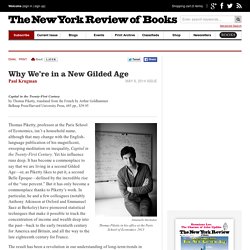

Thomas Piketty Interview About the European Financial Crisis. SPIEGEL: You publicly rejoiced over Alexis Tsipras' election victory in Greece.

What do you think the chances are that the European Union and Athens will agree on a path to resolve the crisis? Piketty: The way Europe behaved in the crisis was nothing short of disastrous. Five years ago, the United States and Europe had approximately the same unemployment rate and level of public debt. But now, five years later, it's a different story: Unemployment has exploded here in Europe, while it has declined in the United States. Our economic output remains below the 2007 level. SPIEGEL: The new leftist government in Athens hasn't exactly gotten off to an impressive start. Piketty: Greece alone won't be able to do anything. SPIEGEL: European governments have tried to avert the crisis by implementing numerous reforms. Why Everyone Is Obsessed With This Academic Book on Economics.
I'm not sure this book will convince everyone...

Personality research suggests that conservatives (people who tend to be high in "consciensciousness" and low in "openness" on the Five Factor model) tend not to have much of a problem with inequality, and tend to see steep and rigid dominance hierarchies as natural*. But if you combine Piketty's book with the book The Spirit Level, it becomes pretty clear that not only does capitalism inevitably create inequality, but also that inequality leads to all sorts of social problems for everybody—lower lifespans, lower technological innovation and social mobility, and higher rates of crime—including violent crime; higher rates of disease & ill-health, addiction, obesity, infant mortality, teen pregnancy... on basically every measure you can name, too much economic inequality makes life worse for a society.
*To some degree, dominance hierarchies are natural—nearly all social animals have them. Branko Milanovic On FT And Piketty. I'm a paragraph.

Click here to add your own text and edit me. I’m a great place for you to tell a story and let your users know a little more about you. I think the FT case is blown out of proportion. It is well-known that wealth data are uncertain. I for one do not know where Piketty's wealth data come from and I am sure very few people do. (Although there are there, that is re. income too, many issues and many choices.
The situation with wealth data --that much I know-- is much worse. And if you create (as Piketty did) bunch of data for a bunch of countries, there are bound to be issues. Now. consider FT points one by one: "One apparent example of straightforward transcription error in Prof Piketty’s spreadsheet is the Swedish entry for 1920. Okay, quite likely. "A second class (sic!) Le capital logement contribue-t-il aux inégalités? Retour sur Le capital au XXIe siècle de Thomas Piketty Odran Bonnet, Pierre-Henri Bono, Guillaume Chapelle et Étienne Wasmer Département d’économie de Sciences Po et LIEPP 17 avril 2014 - wp-25-bonnet-et-
Capital in the Twenty-First Century. Thomas Piketty on Wealth, Income and Inequality. Piketty superstar : Hollande l’a ignoré, l’Amérique l’a adoubé. Why We’re in a New Gilded Age by Paul Krugman. Capital in the Twenty-First Century by Thomas Piketty, translated from the French by Arthur Goldhammer Belknap Press/Harvard University Press, 685 pp., $39.95 Thomas Piketty, professor at the Paris School of Economics, isn’t a household name, although that may change with the English-language publication of his magnificent, sweeping meditation on inequality, Capital in the Twenty-First Century.

Yet his influence runs deep. It has become a commonplace to say that we are living in a second Gilded Age—or, as Piketty likes to put it, a second Belle Époque—defined by the incredible rise of the “one percent.” The result has been a revolution in our understanding of long-term trends in inequality. It therefore came as a revelation when Piketty and his colleagues showed that incomes of the now famous “one percent,” and of even narrower groups, are actually the big story in rising inequality.
Still, today’s economic elite is very different from that of the nineteenth century, isn’t it? Why? Detail. Pourquoi le livre de Piketty est-il un succès aux Etats-Unis ? Le Monde.fr | • Mis à jour le | Par Mathilde Damgé Le livre du Français Thomas Piketty Le Capital au XXIe siècle (Editions du Seuil, 2013) se classait encore, jeudi 24 avril, en tête des ventes aux Etats-Unis sur le site de distribution en ligne Amazon.

Publié l'an dernier en France (lire des extraits sur le site du Seuil), il n'est arrivé que cette année aux Etats-Unis. Mais l'énorme succès rencontré outre-Atlantique par un ouvrage pourtant austère, écrit par un économiste qu'on classe, en France, plutôt à gauche, ne cesse d'étonner. Le site Internet de l'enseignant à l'Ecole d'économie de Paris donne un bon résumé des quelque 1 000 pages (dans la version française) de cet ouvrage, agrémenté de nombreux schémas, qui dénonce la trop forte concentration des richesses et plaide pour une plus lourde taxation des hauts revenus.